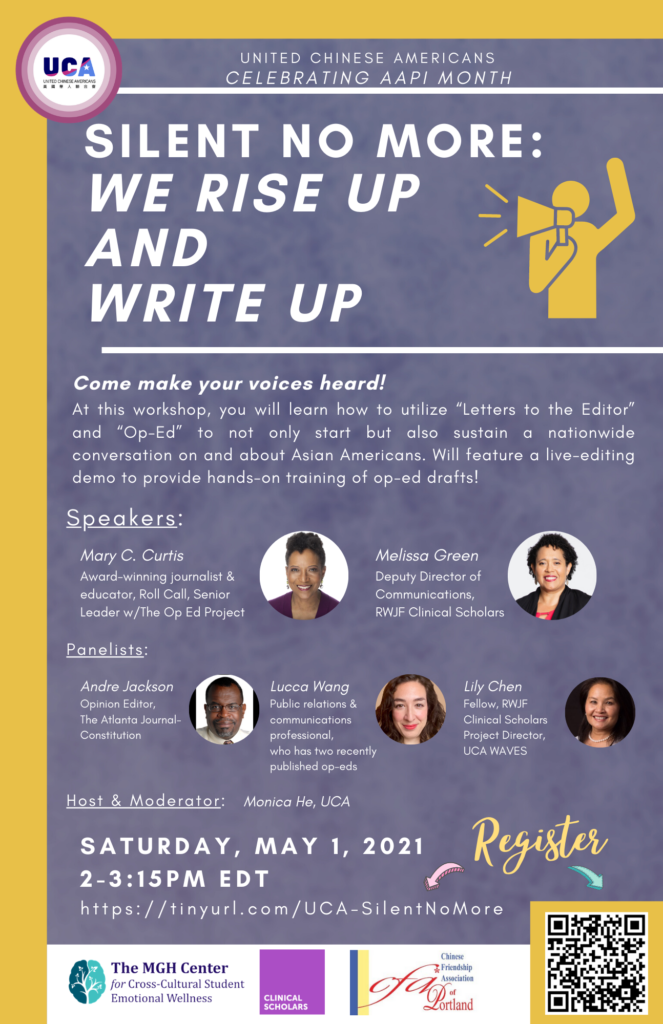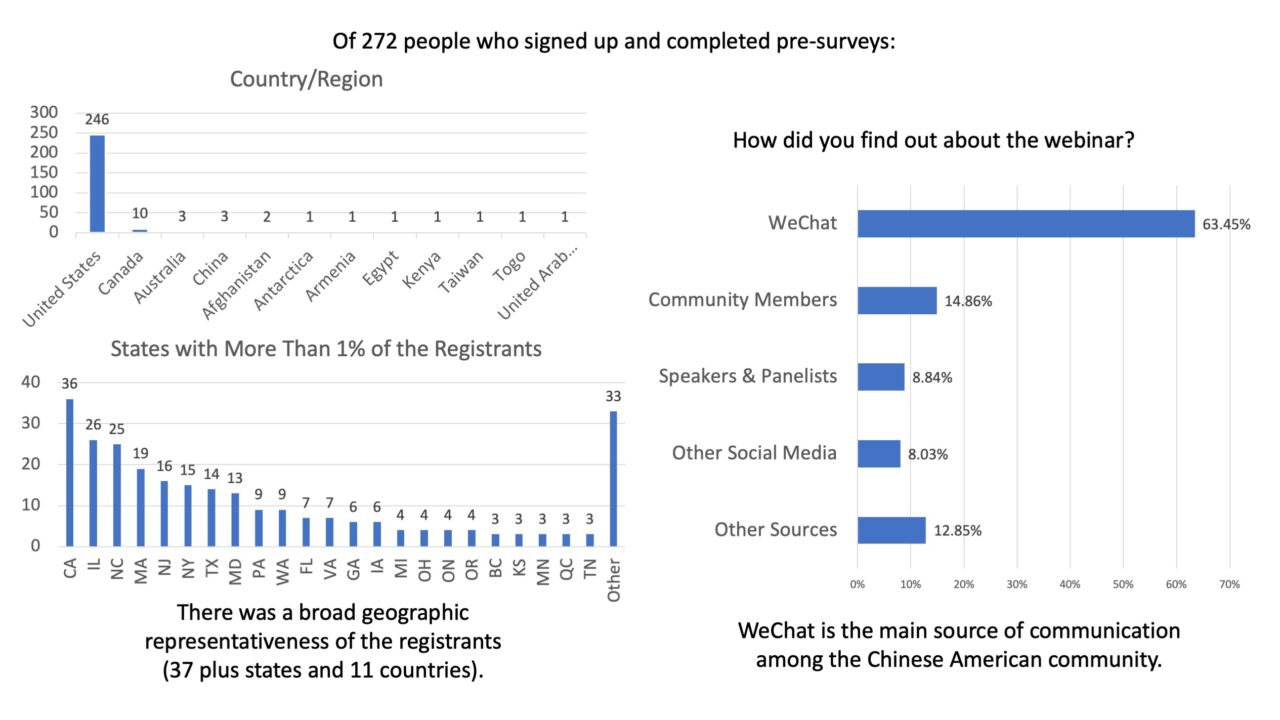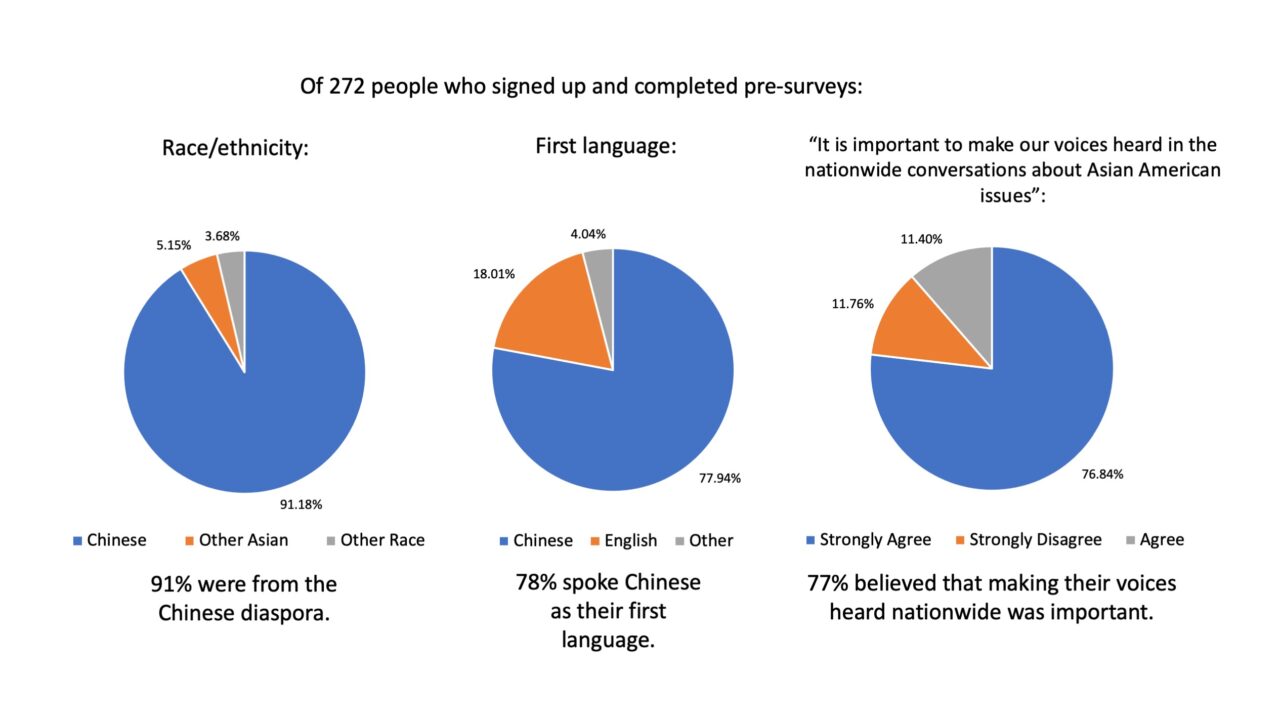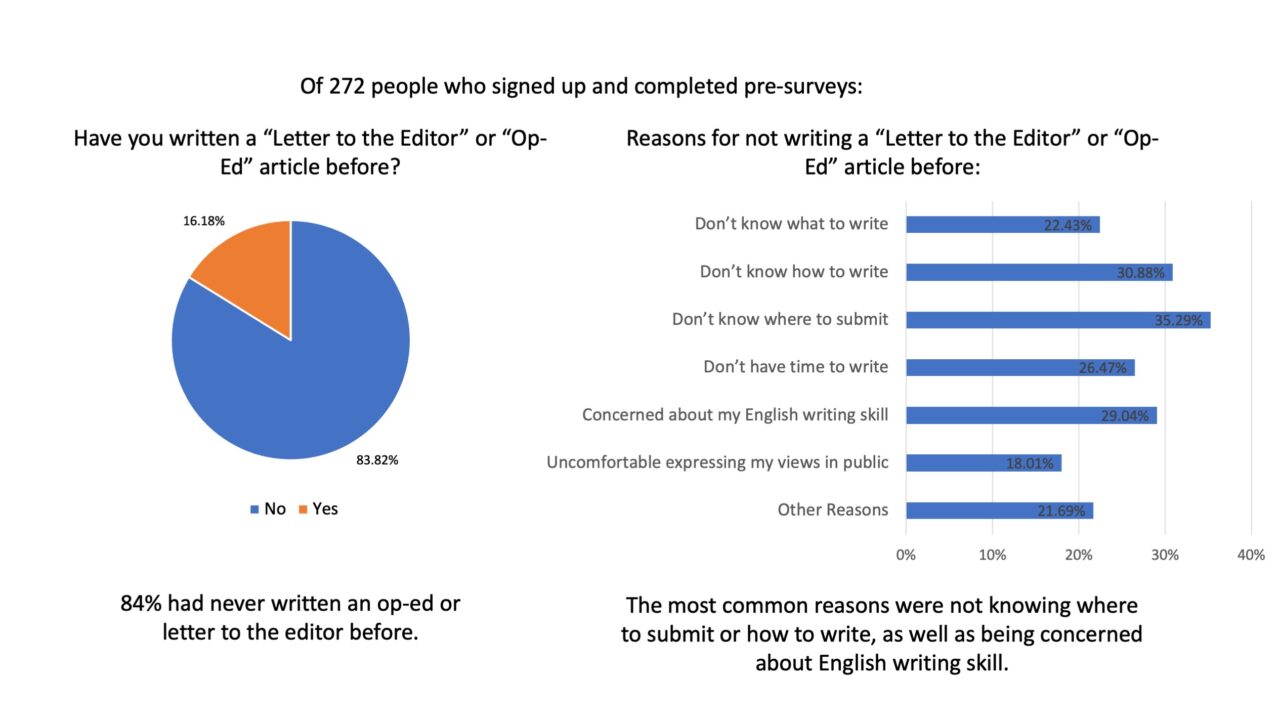Recording now available here
Scroll down for Chinese
On May 1, 2021, UCA held a “Silent No More: We Rise-Up and Write-Up” webinar to kick-off the month-long celebration of Asian American and Pacific Islander Heritage. This webinar was a part of a new initiative that aims to make our voices heard and presence felt through opinions and editorials (op-eds).
UCA President Haipei Shue and Board Member Hardy Li introduced UCA, the event, and the speakers. Speaker Mary C. Curtis, an award-winning journalist, provided information on how to write an op-ed and suggestions to two drafts in a live editing session. Speaker Melissa Green, deputy Director of Communications at Robert Wood Johnson Foundation, talked about how employees at nonprofits and individuals can write op-eds. UCA Advisor Monica He moderated a panel on the editorial and author sides of op-ed writing. The panel consisted of Atlanta Journal-Constitution Editorial Editor Andre Jackson, UCA member, nurse educator, and op-ed authors Lily Chen, and public relations professional Lucca Wang. UCA Communications Chair Changfu Chang provided concluding remarks.
Over 140 people, mostly Asian Americans, attended the webinar. The event has generated considerable interest and enthusiasm; we have received very positive feedback and op-ed drafts from our members. The recording of the webinar is available at below:
Pre-survey data were collected from the 272 people who registered. The main things we noted were:
(1) There was broad geographic representation among the registrants (37+ states and 11 countries).
(2) The sample was self-selective, with very high education levels. The majority were women and adults.
(3) An overwhelming majority of the registrants agreed that is it important to write and publish articles in order to make our voices heard in the nationwide conversations about Asian American issues.
(4) While many of them felt comfortable writing, only a small percentage of them have written an op-ed article before.
(5) There were multiple reasons for the lack of publications. Some of them could be addressed through providing training and resources.
(6) WeChat is the main source of communication among the Chinese American community.
Here is a brief summary of the complete data:
- Demographics
(1) A total of 272 people registered for the webinar.
(2) While the majority of registrants were in the United States, thanks to our online platform we also had international representation from Canada, Australia, China, and Taiwan, as well as seven other countries.
(3) Registrants from the United States were from over 37 states. Seven states had the most registrants (over 5% each): CA, IL, NC, MA, NJ, NY, and TX.
(4) The majority of them were women (73%).
(5) About 91% identified as Chinese.
(6) Most of the registrants were adults; about 3% were youth.
(7) Almost 74% of the registrants have a graduate degree.
(8) 78% of the registrants have Chinese as their first language while 18% have English as the first language.
- Survey Questions
(1) 88% agreed that it is important to make our voices heard in the nationwide conversations about Asian American issues.
(2) 89% agreed that writing and publications by Asian Americans can help advocate for our voices to broader communities on the rise of anti-Asian hate crimes.
(3) 90% agreed that our community members need to reach as many local newspapers as we can by telling our stories and sharing our thoughts.
(4) 75% felt comfortable with writing to local newspapers and other media outlets to express their views.
(5) 92% wanted to learn how to write and submit an article on Asian American issues.
(6) Only 16% have written a “Letter to the Editor” or “Op-Ed” article before.
(7) There were multiple reasons for not being able to write or publish, including not knowing where to submit an article (35%) and how to write (31%), having concerns about English writing skills (29%), (d) not having time to write (26%), etc.
(8) Most of the registrants found out about the webinar through WeChat. Other sources included community members, speakers and panelists from other webinars, and other social media outlets (e.g., Facebook, Instagram, Twitter, LinkedIn).
A few pertinent results are highlighted in the charts below.
Mary C. Curtis
Mary C. Curtis, a columnist at Roll Call, is an award-winning journalist and educator based in Charlotte, N.C., and Washington, D.C. She is host of the CQ Roll Call podcast “Equal Time, with Mary C. Curtis.” She has contributed to NBC News, NPR, The Washington Post, The Root, ESPN’s The Undefeated and talks politics on WCCB-TV and NPR-affiliate WFAE in Charlotte. Curtis has worked at The New York Times, the Charlotte Observer, the Baltimore Sun, and the Associated Press, and was national correspondent for AOL’s Politics Daily. Her coverage specialty is the intersection of politics, culture and race, and she has covered the 2008, 2012, 2016 and 2020 presidential campaigns.
Curtis is a Senior Leader with The OpEd Project, facilitating “Write to Change the World” seminars, at Yale University, Cornell University, and the Ford Foundation and at the Aspen New Voices Fellowship in Johannesburg, South Africa. Curtis was a Nieman Fellow at Harvard University and a Kiplinger Fellow, in social media, at Ohio State.
Curtis was chosen to be included in The HistoryMakers, the single largest archival collection of its kind in the world designed to promote and celebrate the successes and to document movements, events and organizations that are important to the African American community and to American society; it is available digitally and permanently archived in the Library of Congress.
Her honors include Clarion Awards from the Association for Women in Communications, awards from the National Headliners and the Society of Professional Journalists, three first-place awards from the National Association of Black Journalists, two first-place SPJ DC Dateline awards, and the Thomas Wolfe Award for an examination of Confederate heritage groups. Curtis has contributed to several books, including an essay in “Now What: The Voters Have Spoken, Essays on Life After Trump” and “Covering Politics in the Age of Trump.”
Twitter: @mcurtisnc3
Melissa Green
Melissa Green is the Deputy Director for Communications for Clinical Scholars, a Robert Wood Johnson Foundation program. Melissa began her career providing technical assistance to health departments and community-based organizations in North Carolina. Her public health practice and research focus is health equity and collaboration between communities and academic institutions. Her research interests include health disparities across the cancer continuum, peer support interventions, disease prevention, and factors that influence participation in health research. She earned her Masters of Public Health from the UNC-Chapel Hill School of Public Health in Health. She is a staff member of UNC’s Center for Health Equity Research, adjunct faculty in UNC Gillings School of Global Public Health’s Maternal and Child Health department and a doctoral candidate at A. T. Still University.
Andre Jackson
Andre Jackson became Opinion Editor of The Atlanta Journal-Constitution in April 2009. He oversees the newspaper’s thought leadership expressed via its Sunday editorial page and daily opinion pages.
Previously, Jackson was Senior Editor for business, federal and state news at the AJC, which included overseeing the state capital and D.C. bureaus. He joined the AJC in 2008 as an editorial writer covering business and the economy. He began his newspapering career in 1984.
Jian (Lily) Chen
Jian (Lily) Chen: Lily is a First Generation Chinese American, RWJF Clinical Scholar Fellow, UCA WAVES Youth Mental Health Project Director and nurse Educator at North Carolina Central University. She recently wrote an OpEd “ Silenced Voices Speaking Out ” and a letter to the editor “Asian Americans.”
王曦 Lucca Wang
Lucca Wang 王曦 is a biracial and third-generation Chinese American woman native to the Midwest where she lives now. She has been a public relations and communications professional for 14 years, and and has two recently published op-eds in the Kansas City Star and Ms. Magazine on her own experience and perspective and the long history of anti-Asian racism in the U.S. and what is happening now. She is a journalism school graduate of Drake University and an alum of The Op-Ed Project.
Co-hosted by United Chinese Americans (UCA) and the Asian and Pacific Islander Caucus of the University of North Carolina (www.apicunc.org)

UCA讲座回顾|“不再沉默:我们奋起书写”——如何让英文媒体发出我们的声音!
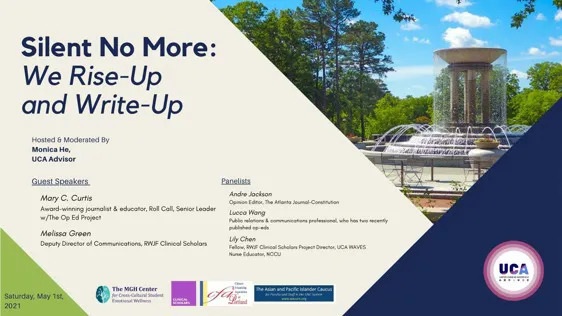
2021年5月1日,美国华人联合会(UCA)举行了“不再沉默:我们奋起书写”网络研讨会,开始了纪念为期一个月的亚裔美国人和太平洋岛民遗产月的活动。本次网络研讨会是UCA一项新倡议的一部分,该倡议旨在通过专栏文章来表达我们的声音和存在感。
UCA主席薛海培(Haipei Shue)和董事会成员黎观城(Hardy Li)做了致辞,介绍了UCA。 UCA顾问何凯元(Monica He)做主持人。此次活动的演讲嘉宾是屡获殊荣的新闻记者玛丽·C·柯蒂斯(Mary C. Curtis),她介绍如何撰写专栏文章,并在现场就两篇来稿做了编辑示范。罗伯特·W·约翰逊基金会(Robert Wood Johnson Foundation)传媒部副主任梅利莎·格林(Melissa Green)谈到了非盈利组织和个人如何撰写意见书的问题。
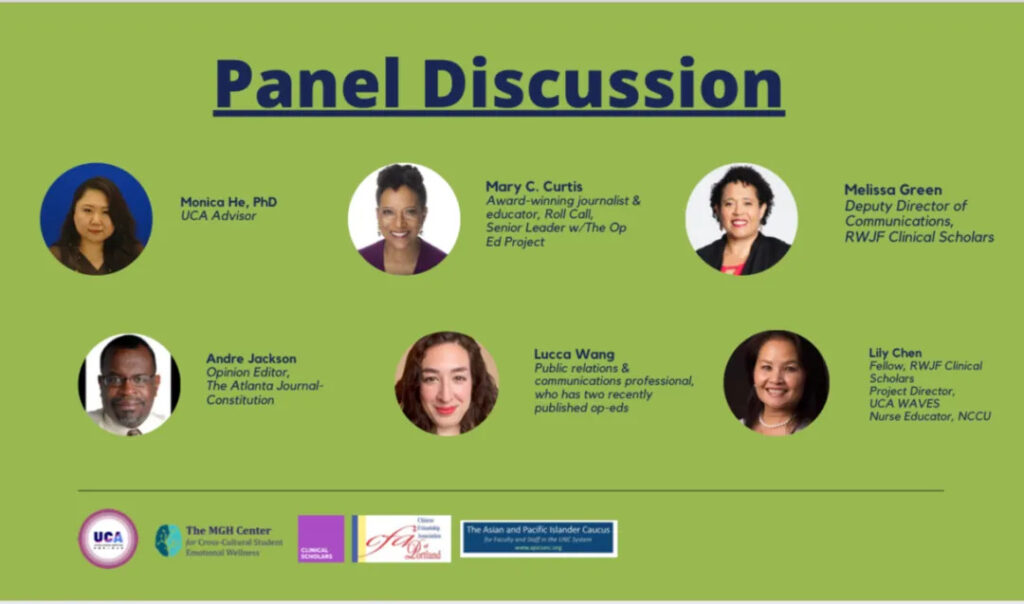
随后,报纸编辑和专栏作者进行讨论、互动。参加这次讨论的有:著名的由《亚特兰大宪法报纸》的专栏版编辑安德烈·杰克逊(Andre Jackson),UCA成员、护士教育家,专栏作者陈健(Lily Chen)和公共关系专业人士、专栏作者王曦(Lucca Wang)组成。 UCA媒体负责人常昌富教授作了总结发言。
本次共超过156人(主要是亚裔美国人)参加了网络研讨会,引起了公众强烈的兴趣和热情,收到了来自成员的非常积极的反馈和意见草稿。
观看完整讲座视频:请点击这里
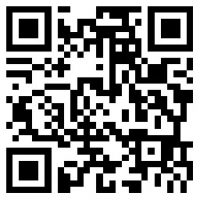
在活动开始前,我们在注册过程中进行了问卷调查,并对数据进行了分析。
(1)该调查在注册人中有广泛的地域代表性(37个州和11个国家)。
(2)调查样本是自我选择性的,调查者受教育程度普遍很高。多数是女性和成年人。
(3)绝大多数注册人表示,在全国范围内用撰写和发表文章这个方式和行为来进行有关亚裔美国人问题的讨论和表达我们的声音是非常重要的。
(4)虽然只有一小部分人以前写过一篇专栏文章,但是他们中的很多人都能很流畅进行语言表达
(5)有关话题的出版物很少,原因表现在很多方面。其中一些原因是可以通过提供培训和提供资源来解决的。
(6)微信是华裔美国人社区之间交流的主要工具。
以下是完整数据的简短摘要:
1.人口统计
(1)本次共有272人注册了该网络研讨会。
(2)虽然大多数注册人都在美国,但由于我们的在线平台,我们还拥有加拿大,澳大利亚,中国(台湾地区)以及其他七个国家的调查数据。
(3)来自美国的注册人来自37个州。其中这七个州的注册人最多(每个州超过5%):CA,IL,NC,MA,NJ,NY和TX。
(4)调查数据群体中大多数是女性(73%)。
(5)大约91%的群体是中国人。
(6)大多数注册人是成年人;大约3%是青年。
(7)几乎74%的注册人具有研究生学位。
(8)78%的注册人以中文为第一语言,18%的人以英语为第一语言。
2.调查问题
(1)88%的人同意关于亚裔美国人的问题,我们需要在全国范围内表达我们的声音。
(2)89%的人同意,亚裔美国人的文献和出版物可以帮助我们在反亚裔仇恨犯罪的兴起中向更广泛的社区倡导我们的声音。
(3)90%的人同意,我们的社区成员需要通过讲故事和分享思想来联系尽可能多的当地报纸来表达声音。
(4)75%的人愿意写信给当地报纸和其他媒体以表达意见。
(5)92%的人想学习如何撰写和提交有关亚裔美国人问题的文章的过程。
(6)只有16%的人以前给编辑写过投稿文章。
(7)无法写作和无法发表文章的原因有很多,比如不知道在哪里提交文章(35%)和如何写作(31%),对英语写作技巧的担忧(29%),没有时间写(26%)等。
(8)大多数注册人通过微信了解到有关网络研讨会的信息。其他来源包括社区成员,来自其他网络研讨会的发言人和小组成员,以及其他社交媒体(如,Facebook,Instagram,Twitter,LinkedIn)。下图突出显示了一些相关的结果。
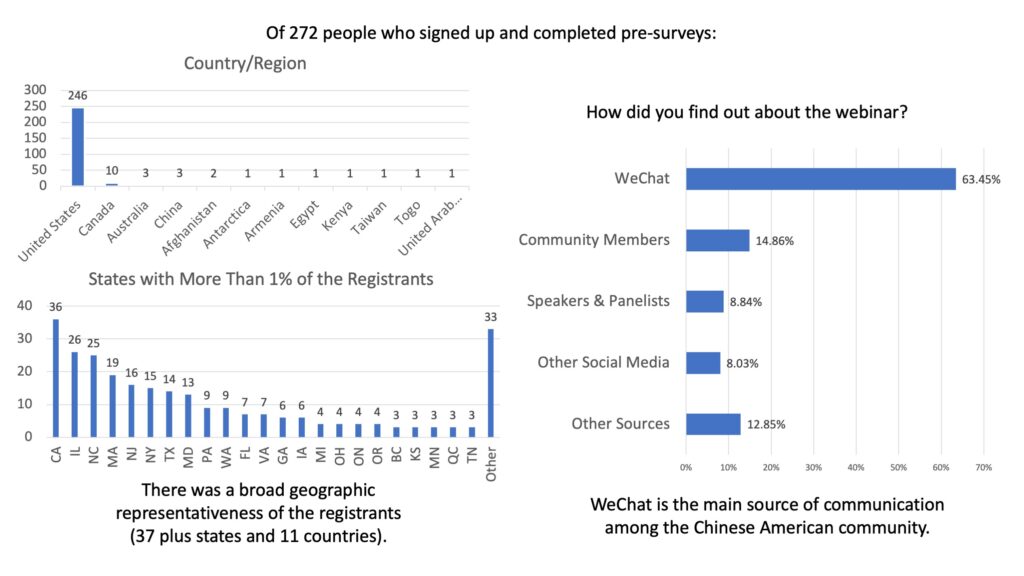
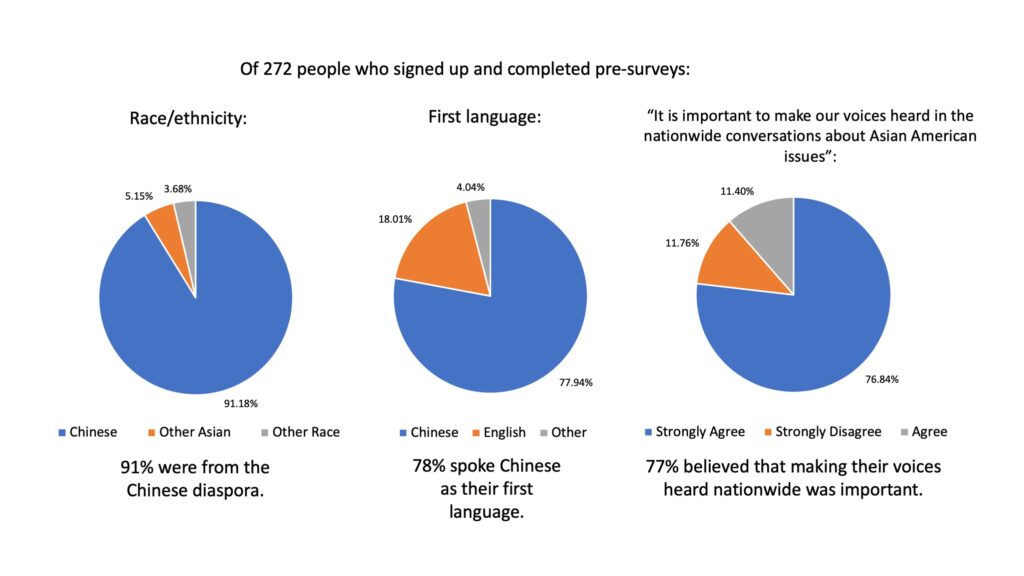
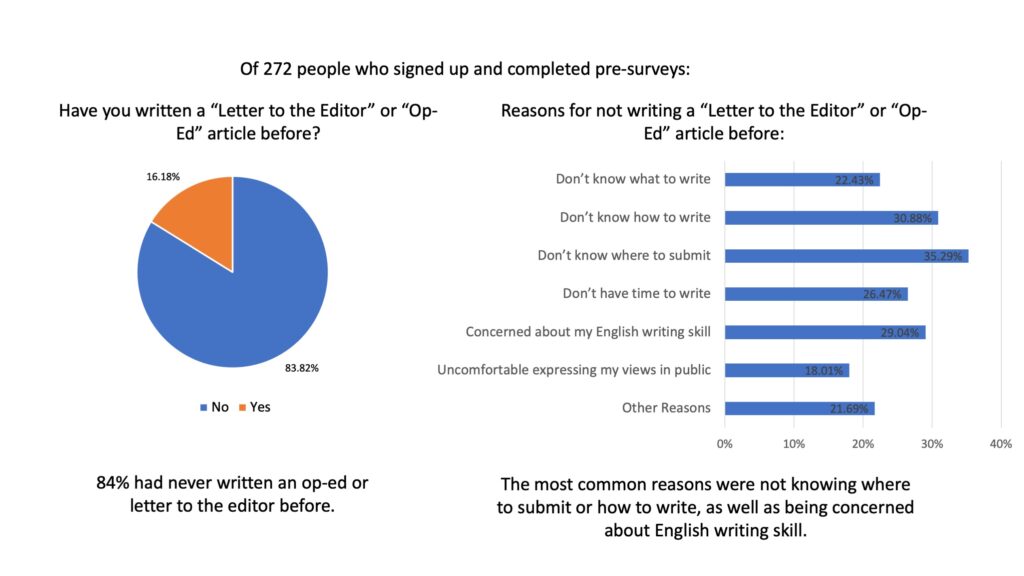
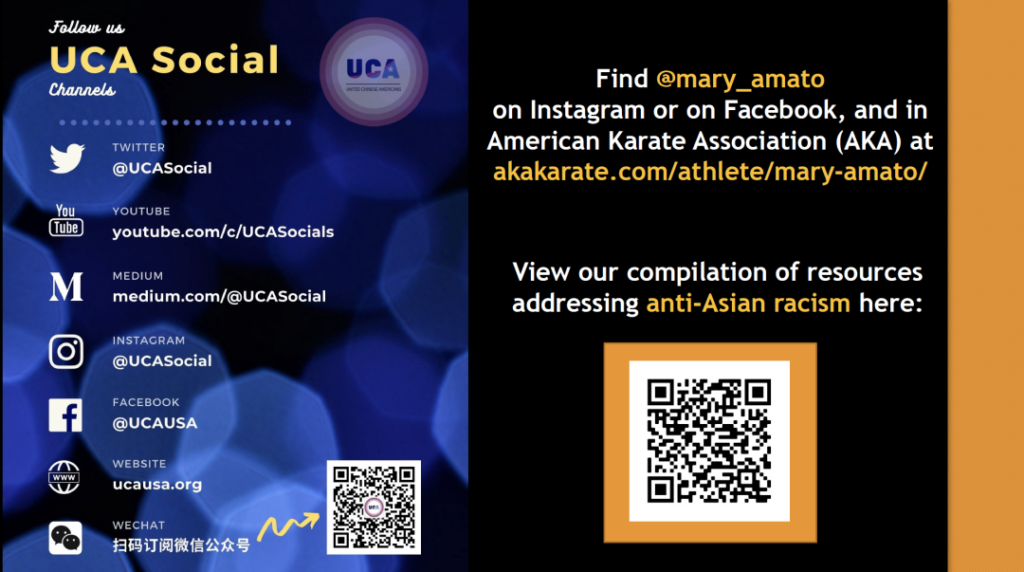
Mary C. Curtis
Mary C. Curtis 是Roll Call的专栏作家,是一位获奖的记者和教育家,居住于北卡罗来纳州夏洛特和华盛顿特区。她是CQ Roll Call播客“Equal Time, with Mary C. Curtis.”的主持人。她曾为NBC News, NPR, The Washington Post, The Root, ESPN’s The Undefeated做出贡献,并在夏洛特的WCCB-TV and NPR-affiliate WFAE上谈论政治。
Curtis供职于《纽约时报》、《夏洛特观察家报》、《巴尔的摩太阳报》和美联社,并担任美国在线《政治日报》的全国记者。她的报道专长是政治、文化和种族的交集,她曾报道过2008年、2012年、2016年和2020年的总统竞选活动。
Curtis是“专栏文章”的资深编辑,协助在耶鲁大学、康奈尔大学、福特基金会和南非约翰内斯堡的阿斯彭新声奖学金举办了“写作改变世界”研讨会。Curtis曾获得哈佛大学尼曼奖学金和俄亥俄州立大学社交媒体吉卜林格奖学金。
Curtis被选入 The HistoryMakers,这是世界上最大的档案馆,旨在宣传并记录非裔美国人社区和美国社会重要的运动、事件和组织,它可以在国会图书馆以数字方式永久存档。
她的荣誉包括美国女性传媒协会颁发的号角奖、全国头条新闻和专业记者协会颁发的奖项、全国黑人记者协会颁发的三项一等奖、两项SPJ DC Dateline一等奖,以及托马斯沃尔夫奖。Curtis撰写了几本书,包括一篇文章《现在该做什么: 选民们的发言,特朗普之后的生活随笔》(Now What: The Voters Have Spoken, Essays on Life After Trump)和《特朗普时代的政治报道》(Covering Politics in The Age of Trump)。
Melissa Green
Melissa 是罗伯特·伍德·约翰逊基金会(Robert Wood Johnson Foundation)临床学者交流项目的副主任。
Melissa的职业生涯始于为北卡罗莱纳州的卫生部门和社区组织提供技术援助。她的公共卫生实践和研究重点是卫生公平和社区与学术机构之间的合作。
她的研究兴趣包括癌症连续体的健康差异、疾病预防和影响健康因素等。她获得了北卡罗来纳大学教堂山分校公共卫生学院的公共卫生硕士学位。她是北卡罗来纳大学健康公平研究中心的工作人员,北卡罗来纳大学吉林斯全球公共卫生学院孕产妇和儿童健康系的兼职教员,以及a . T. Still大学的博士候选人。
- 研讨小组成员:
Andre Jackson
陈健(Lily Chen)
王曦(Lucca Wang)
Andre Jackson
Andre是亚特兰大宪法杂志和AJC.com的言论版编辑。
2009年4月,他成为《亚特兰大宪法杂志》的言论版编辑,负责管理报纸的周日社论版和每日观点版。
此前,Andre是AJC商业、联邦和州新闻的高级编辑,负责管理亚特兰大和首都华盛顿特区的分社。他于2008年加入AJC,担任商业和经济方面的社论作家。他于1984年开始他的新闻事业。
陈健 Jian (Lily) Chen
Lily是第一代美籍华人,RWJF临床学者,UCA WAVES青年心理健康项目主任,北卡罗来纳中央大学护士教育家。她最近写了一篇专栏文章“沉默的声音在说话”在AJC.com上发表,还给北卡报纸New and Observers写了一封信“亚裔美国人”。
王曦 Lucca Wang
Lucca 是第三代美籍华人,她现在居住在美国中西部。她是一名专业的媒体工作者,过去五年一直从事媒体公关工作。
她最近在《堪萨斯城星报》《mmagazine》上发表了两篇专栏文章,内容包括她自己的经历和观点,以及美国反亚裔种族主义的悠久历史和现在正在发生的事情。
她毕业于德雷克大学(Drake University)新闻学院,是The Op-Ed Project的校友。
- 闭幕致辞:
Changfu Chang, 美国华人联合会(UCA)媒体委员会主席
- 主办方:
美国华人联合会(UCA)
- 协办方:
Chinese Friendship Association of Portland
Robert Wood Johnson Foundation Clinical Scholar
The MGH Center for Cross-Cultural Students Emotional Wellness
The Asian and Pacific Islander Caucus
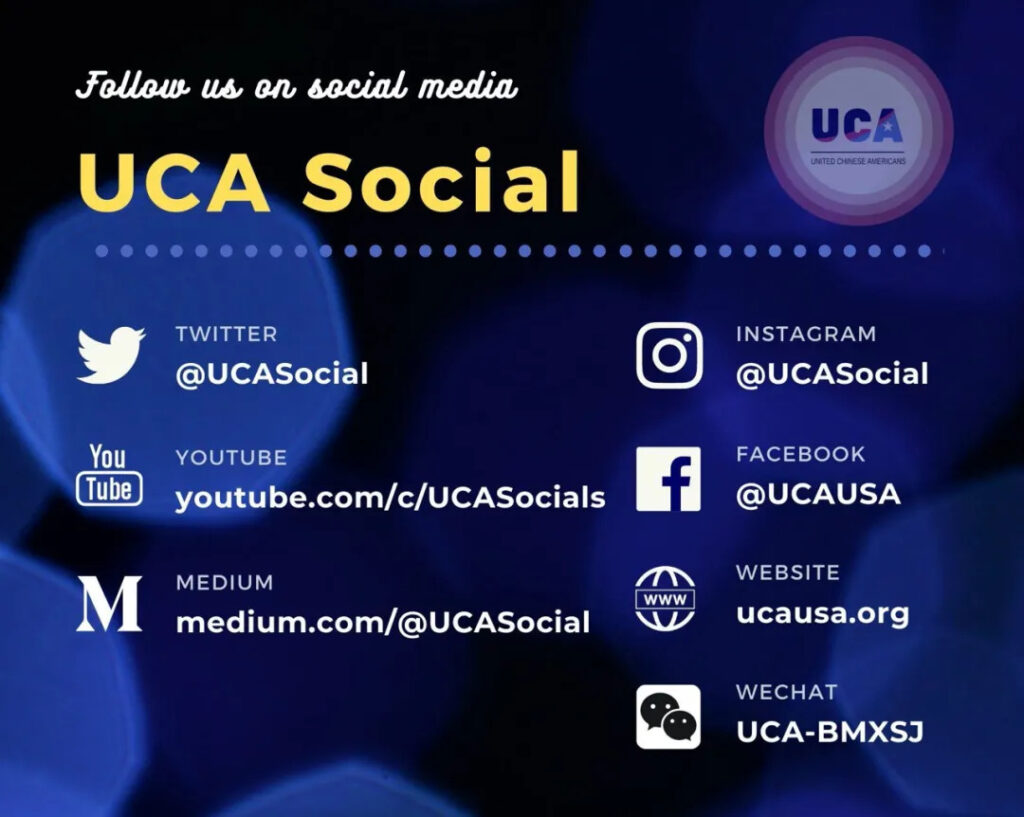
For the original blog, please visit here.
